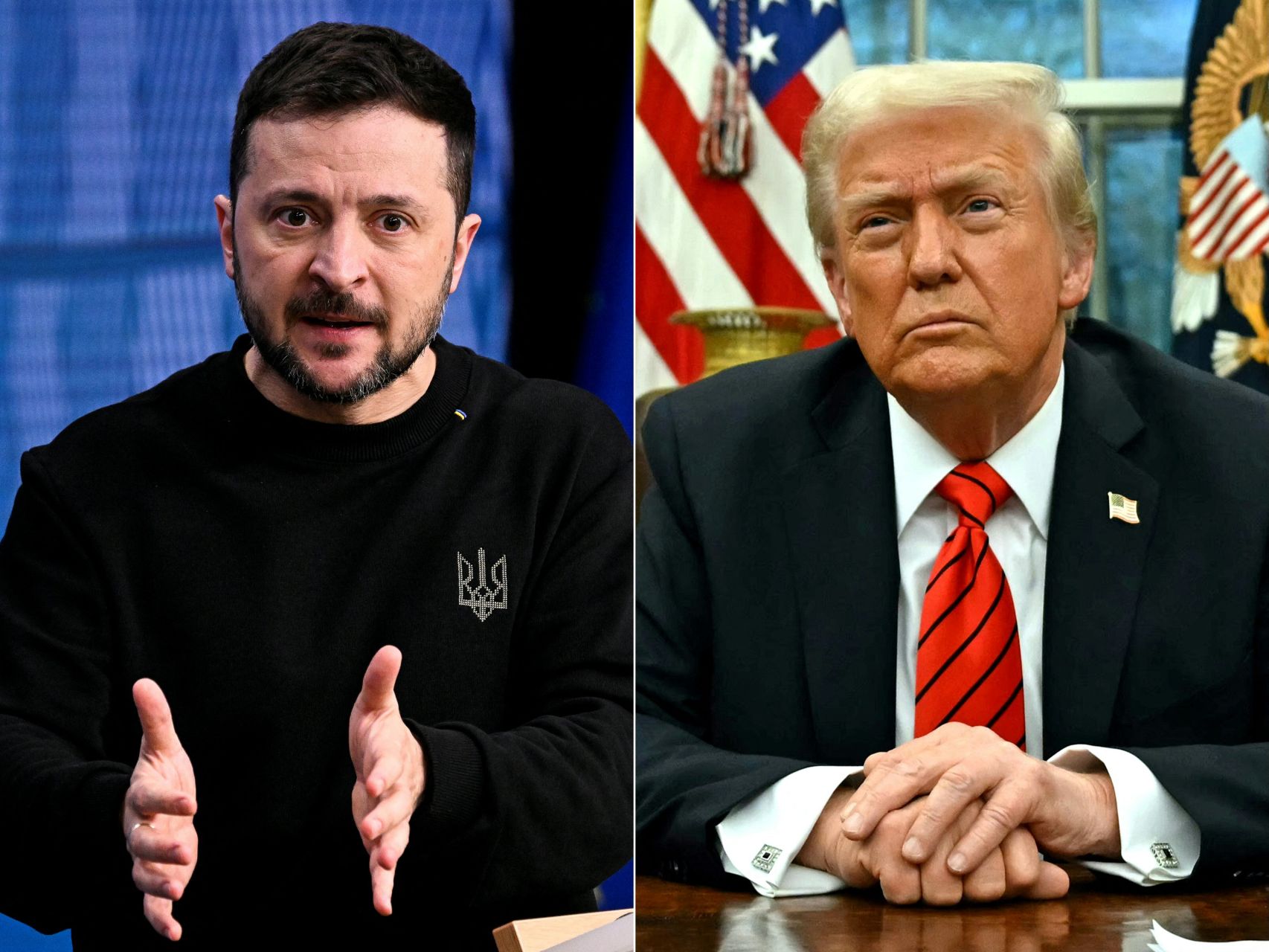- Home
- Middle East
- Trump Turns Against Zelensky - and Towards Russia

This combination of pictures created on February 19, 2025 shows, L-R, Ukraine's President Volodymyr Zelensky in Brussels on December 19, 2024 and US President Donald Trump in Washington, DC, on February 10, 2025. © JOHN THYS and ANDREW CABALLERO-REYNOLDS / AFP
Donald Trump has not just turned against Volodymyr Zelensky by branding the Ukrainian president a "dictator" – he has also turned towards Russia's narrative about its invasion, deepening uncertainty about Kyiv's fate.
Tensions had bubbled for days over Trump's sudden decision to open talks with Moscow while excluding Ukraine, before they boiled over into an extraordinary war of words between the two leaders.
But it was not just the sudden rift with Kyiv's biggest backer that was most worrying for Ukraine and its European allies – it was the way that Trump has started openly echoing many of Moscow's favorite talking points about the war.
When Trump talked about how Ukraine started the war, quoted false figures about Zelensky's popularity, urged him to call elections and ruled out NATO membership, analysts said it would all have sounded suspiciously familiar to many in Kyiv.
"It looks like he's preparing a big sell-out of Ukraine," Max Bergmann, director of the Europe, Russia and Eurasia program at the Center for Strategic and International Studies, told AFP.
Bergmann said Trump seemed to be "creating a predicate for the United States to simply wash its hands of supporting Ukraine, and to focus on having a relationship with Moscow."
Trump has an "affinity for Vladimir Putin" and an "affinity for the strongman style that Putin has," he added.
'Comedian'
When Russia invaded Ukraine almost exactly three years ago, Zelensky was hailed as a hero in the United States.
But Trump was not at the party; in fact, he'd had tense relations ever since he was impeached for the first time in 2019 over delaying assistance to Ukraine as he pressed Zelensky to dig up dirt on Joe Biden's family before the 2020 election.
Support for Ukraine was also not part of Trump's "America First" agenda.
He's long opposed the billions of dollars in aid that Biden sent to Ukraine, and pledged during the 2024 election campaign to end the Ukraine conflict before taking office, sparking further fears he would push Kyiv into an unfavorable deal.
The Republican's shock announcement of a call with Putin last week had initially been tempered with a call to Zelensky immediately afterwards. But it rankled with Zelensky, and the tensions grew after Russian and US officials met in Saudi Arabia on Monday.
In the gilded halls of his Mar-a-Lago resort on Tuesday, Trump said Kyiv started the war.
Zelensky responded by saying that Trump was in a Russian "disinformation space."
Trump furiously doubled down, first saying on social media that Zelensky was a "comedian" and a "dictator without elections."
There was criticism from some Republicans, including Trump's former vice president Mike Pence.
But it quickly became clear that it wasn't an outburst – it was now US policy, with the White House reposting his comments on social media and officials rushing to the airwaves to defend them.
"Why hasn't President Zelensky tried to end this war for the betterment of his country?" National Security Advisor Mike Waltz told Fox News.
'Kill the patient'
For Ukraine and Europe, the clash just intensified the whiplash from last week's announcement.
"A lot of the language, including his echoing of Kremlin talking points, indicates that maybe he's just giving away the farm to Russia," said Henry Hale, Professor of Political Science and International Affairs at George Washington University.
But Hale said that while the Ukrainians should be worried, "I don't think they should give up all hope...Trump's negotiating style is to keep everybody off balance."
US Vice President JD Vance even seemed to offer Zelensky some advice, telling the Daily Mail that "badmouthing" Trump in public was an "atrocious" way to deal with Trump's administration.
European leaders are meanwhile still scrambling to respond.
French President Emmanuel Macron and British Prime Minister Keir Starmer – who have both offered to send peacekeeping troops to Ukraine – are both expected at the White House next week, but have also called Zelensky to offer support.
Others, including German Chancellor Olaf Scholz, criticized Trump.
But former British prime minister and Trump ally Boris Johnson played down Trump's comments, saying they were "not intended to be historically accurate but to shock Europeans into action."
Bergmann agreed that Trump's comments could indeed be a "real pivot point" for Europeans – but he had a warning.
"Now, sometimes shocks are effective at getting you going," Bergmann said. "Sometimes they can kill the patient."
By Danny KEMP, AFP
Read more




Comments